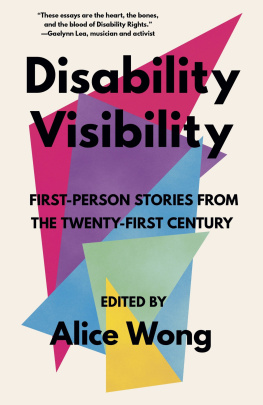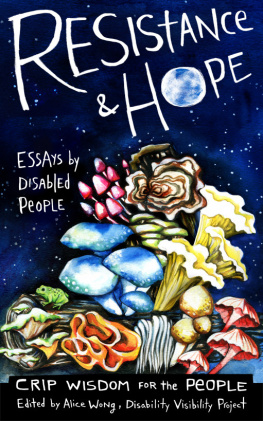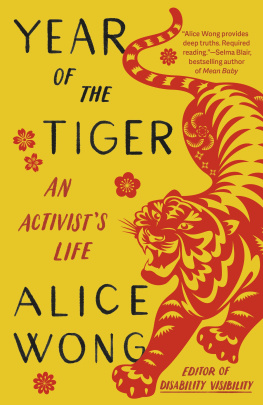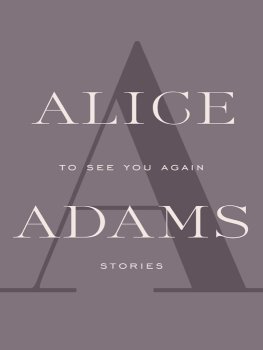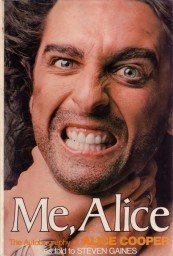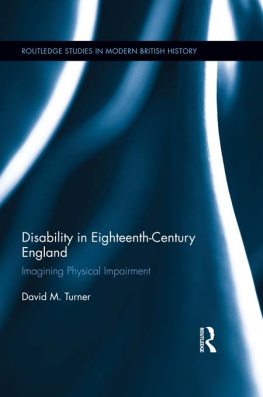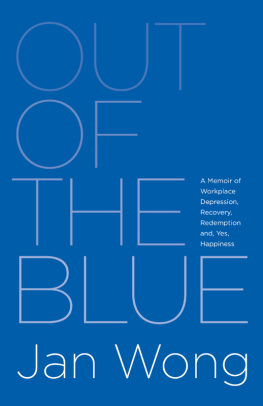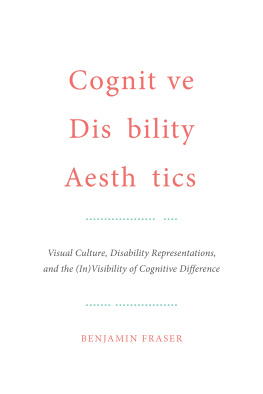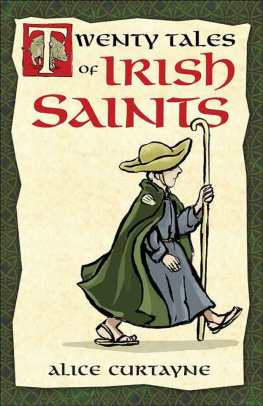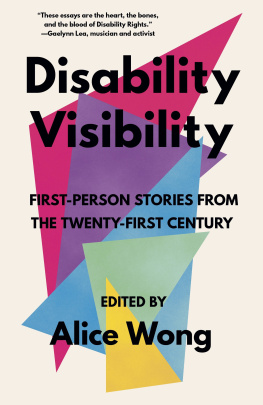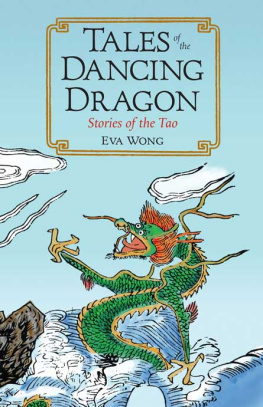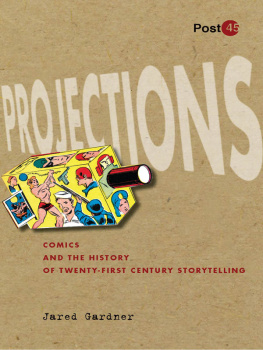Alice Wong - Disability Visibility: First-Person Stories from the Twenty-First Century
Here you can read online Alice Wong - Disability Visibility: First-Person Stories from the Twenty-First Century full text of the book (entire story) in english for free. Download pdf and epub, get meaning, cover and reviews about this ebook. year: 2020, publisher: Knopf Doubleday Publishing Group, genre: Home and family. Description of the work, (preface) as well as reviews are available. Best literature library LitArk.com created for fans of good reading and offers a wide selection of genres:
Romance novel
Science fiction
Adventure
Detective
Science
History
Home and family
Prose
Art
Politics
Computer
Non-fiction
Religion
Business
Children
Humor
Choose a favorite category and find really read worthwhile books. Enjoy immersion in the world of imagination, feel the emotions of the characters or learn something new for yourself, make an fascinating discovery.
- Book:Disability Visibility: First-Person Stories from the Twenty-First Century
- Author:
- Publisher:Knopf Doubleday Publishing Group
- Genre:
- Year:2020
- Rating:5 / 5
- Favourites:Add to favourites
- Your mark:
- 100
- 1
- 2
- 3
- 4
- 5
Disability Visibility: First-Person Stories from the Twenty-First Century: summary, description and annotation
We offer to read an annotation, description, summary or preface (depends on what the author of the book "Disability Visibility: First-Person Stories from the Twenty-First Century" wrote himself). If you haven't found the necessary information about the book — write in the comments, we will try to find it.
Disability Visibility: First-Person Stories from the Twenty-First Century — read online for free the complete book (whole text) full work
Below is the text of the book, divided by pages. System saving the place of the last page read, allows you to conveniently read the book "Disability Visibility: First-Person Stories from the Twenty-First Century" online for free, without having to search again every time where you left off. Put a bookmark, and you can go to the page where you finished reading at any time.
Font size:
Interval:
Bookmark:
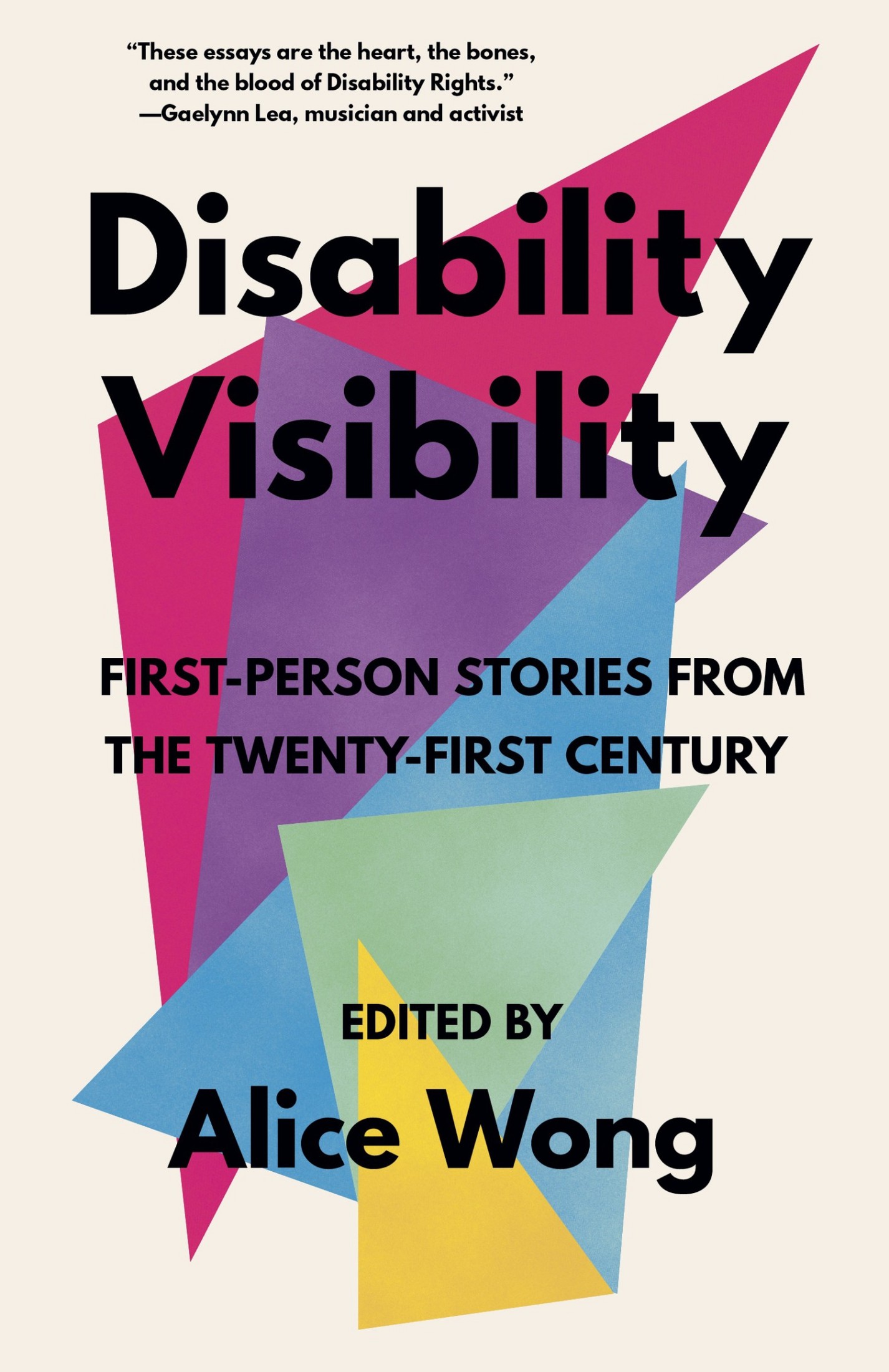
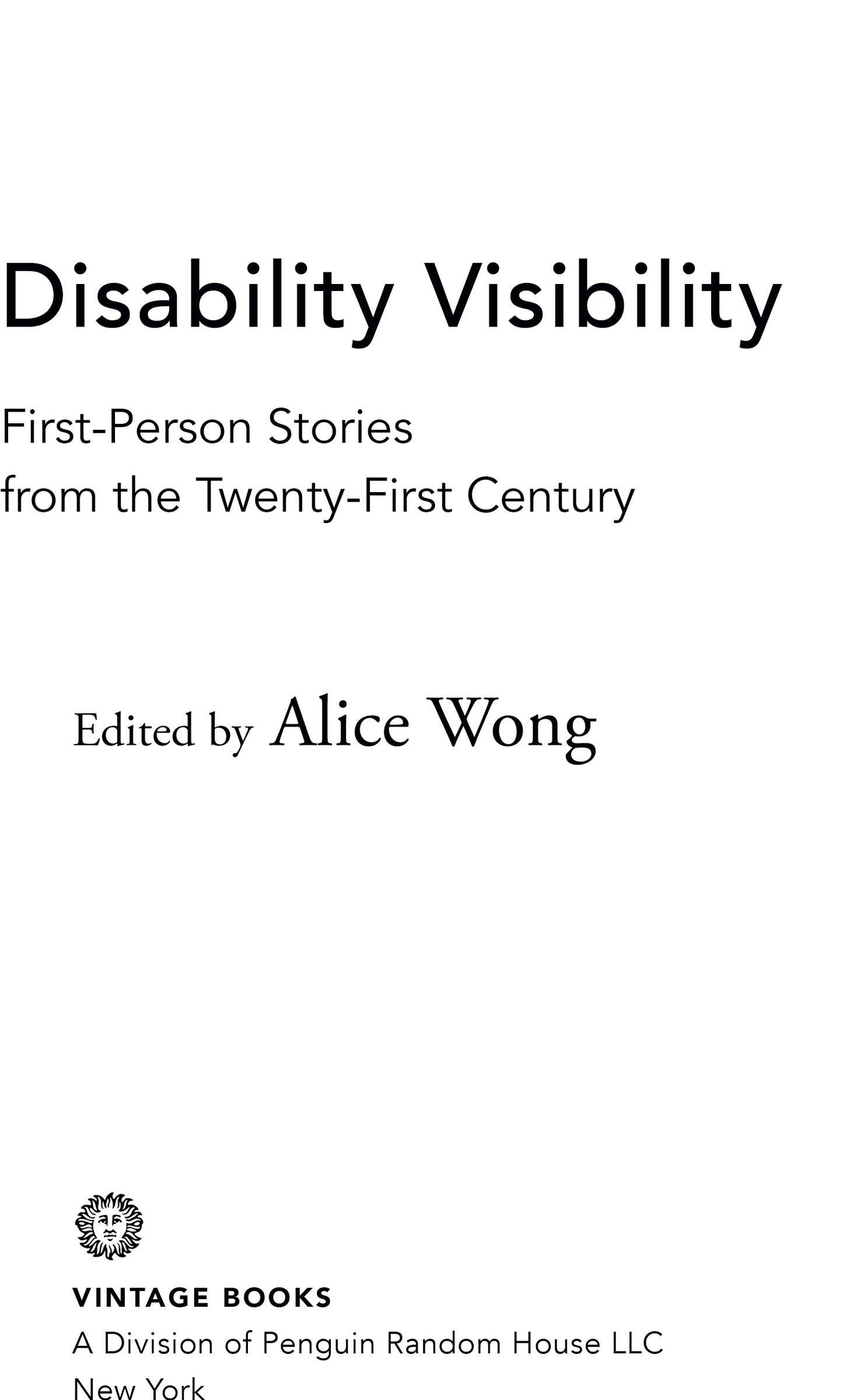
A VINTAGE BOOKS ORIGINAL, JUNE 2020
Introduction and compilation copyright 2020 by Alice Wong
All rights reserved. Published in the United States by Vintage Books, a division of Penguin Random House LLC, New York, and distributed in Canada by Penguin Random House Canada Limited, Toronto.
Vintage and colophon are registered trademarks of Penguin Random House LLC.
constitutes an extension of this copyright page.
Library of Congress Cataloging-in-Publication Data
Names: Wong, Alice, 1974 editor.
Title: Disability visibility : twenty-first century disabled voices / edited by Alice Wong.
Description: First Vintage Books edition. | New York : Vintage Books, a division of Penguin Random House LLC, 2020.
Identifiers: LCCN 2019052398 (print) | LCCN 2019052399 (ebook)
Subjects: LCSH: People with disabilitiesUnited StatesBiography. | People with disabilitiesUnited StatesSocial conditions.
Classification: LCC HV1552.3 .D57 2020 (print) | LCC HV1552.3 (ebook) | DDC 305.9/08092273dc23
LC record available at https://lccn.loc.gov/2019052398
Vintage Books Trade Paperback ISBN9781984899422
Ebook ISBN9781984899439
Editor photograph Eddie Hernandez Photography
Cover design by Madeline Partner
www.vintagebooks.com
ep_prh_5.5.0_c0_r0
To my younger self and all the disabled kids today who cant imagine their futures. The world is ours, and this is for all of us.
Disability is not a brave struggle or courage in the face of adversity. Disability is an art. Its an ingenious way to live.
Neil Marcus
Remember, you werent the one
Who made you ashamed,
But you are the one
Who can make you proud.
Laura Hershey
The word special, as it is applied to disability, too often means a bit shit.
Stella Young
Storytelling itself is an activity, not an object. Stories are the closest we can come to shared experience.Like all stories, they are most fundamentally a chance to ride around inside another head and be reminded that being who we are and where we are, and doing what were doing, is not the only possibility.
Harriet McBryde Johnson,
Too Late to Die Young: Nearly True Tales from a Life (2006)
Staying alive is a lot of work for a disabled person in an ableist society, and that work has been a big part of my forty-six years on this planet. I grew up seeing very few images that looked like me in books, film, or television. In that absence, how does one realize that something is even missing? Last year there was a photograph that went virala young girl in a wheelchair, transfixed by a beauty ad featuring a woman in a similar chair. The two ultimately met in person, and their story made me wonder about my own childhoodhow my worldview would have changed if I had seen someone like me as a glamorous, confident adult. As I grew older, discovering a community of disabled people and learning our stories gave me a sense of what is possible.
I began to notice and save stories about disability that meant something to me. In high school, I read an article in Time about accessible public transit. I was incredibly excited about the prospect of accessible transportation and I wrote a letter to the editor expressing a wish that this would expand. I lived in the suburbs, and the idea of being able to go to places on my own by bus or train seemed like a faraway dream. The letter was published in a subsequent issue, and it was thrilling to see my name in printthe first time Id advocated for something on the record as a disabled person. The article sparked my curiosity for more stories and information. As my collection grew, I had file folders filled with newspaper and magazine clippings. I now have multiple bookmark folders on my web browser where I save links by subjectthey number in the hundreds. In surrounding myself with these stories, I found and developed my own voice.
My collection led me to community. I didnt grow up part of the ADA (Americans with Disabilities Act) generationI was a sophomore in high school when the law was passedbut it had profoundly changed my life and millions of others, giving us a civil rights law we could call our own. In 2014, disabled people throughout the United States were preparing for the following years twenty-fifth anniversary of the ADA. I wanted to mark the upcoming milestone, but wasnt affiliated with any major advocacy or media organization and wasnt certain how I could contribute as an individual. I was, however, certain about three things: (1) I wanted to see more stories about the disabled experience in the present while honoring the past; (2) I wanted to see more stories about everyday people rather than the usual very important people duly mentioned at each ADA anniversary; and (3) I wanted to increase the diversity of the mainstream representation of disability, which remains very white and very male (just take a look at disabled characters in film from the last thirty years, from Daniel Day-Lewiss performance in My Left Foot to Bryan Cranston in The Upside).
Partnering with StoryCorps, a national oral history organization, I created the Disability Visibility Project (DVP) to record oral histories and archive them at the Library of Congress. I originally planned the partnership as a one-year campaign, a way for disabled people to celebrate and preserve their stories in the lead-up to the ADA anniversary. In one memorable DVP recording, Jessie Lorenz talked with her friend Herb Levine about his involvement in the 1977 504 sit-insthe longest nonviolent occupation of a federal building. Section 504 of the Rehabilitation Act of 1973 was a federal law that outlawed discrimination based on disability in any program or activity receiving federal funding. Section 504 acknowledged that disability rights are civil rights, laying the groundwork for the ADA. However, in 1977, the regulations that would actually enforce the law remained unsigned, due to years of delay by the Department of Health, Education, and Welfare. On April 5 of that year, Deaf and disabled protesters took over the Federal Building at 50 United Nations Plaza in downtown San Francisco, demanding action. Bay Area public radio station KALW produced and broadcast Herbs story. He recounted to Jessie how he reentered the building by impersonating a member of the clergy, bringing two other disabled people back in as members of his choir. These kinds of storiesthe funny, personal moments in disability historyare just as significant as those about leaders and politicians. We need more of these stories, even if they never make it into a history book.
What started as a small oral history project kept going and blew up into a movement. The DVP now has approximately 140 oral histories on record at StoryCorps, a small but mighty archive of the disability zeitgeist. And the project has expanded into an online community that creates, shares, and amplifies disability media and culture through a podcast, articles, Twitter chats, and more. The DVP has always been a one-woman operation, but this doesnt mean I do everything alone. Collaborating and partnering with disabled people is something that brings me epic, Marie Kondolevel joy. Each project builds on the last, and the DVP was just the start. What I have always been hoping to accomplish is the creation of community.
Font size:
Interval:
Bookmark:
Similar books «Disability Visibility: First-Person Stories from the Twenty-First Century»
Look at similar books to Disability Visibility: First-Person Stories from the Twenty-First Century. We have selected literature similar in name and meaning in the hope of providing readers with more options to find new, interesting, not yet read works.
Discussion, reviews of the book Disability Visibility: First-Person Stories from the Twenty-First Century and just readers' own opinions. Leave your comments, write what you think about the work, its meaning or the main characters. Specify what exactly you liked and what you didn't like, and why you think so.

